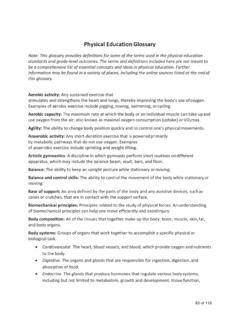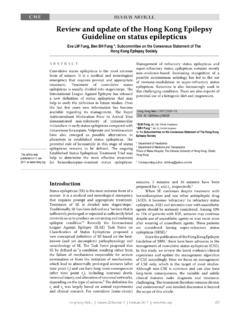Transcription of Dear Personal Trainer Certification Candidate,
1 Dear Personal Trainer Certification candidate , NETA s Personal Trainer Certification is accredited by the National Commission for Certifying Agencies (NCCA). NETA received NCCA accreditation of its Personal Trainer Certification by submitting an application demonstrating the program s compliance with the NCCA s Standards for the Accreditation of Certification Programs. NCCA is the accrediting body of the Institute for Credentialing Excellence. Since 1977, the NCCA has been accrediting certifying programs based on the highest quality standards in professional Certification to ensure the programs adhere to modern standards of practice in the Certification industry.
2 The process of earning accreditation is extensive, including the input of many subject matter experts (SMEs) to conduct a practice analysis of the Personal Trainer s role and responsibilities and to develop the Certification exam. NETA s The Fitness Professional s Manual, 5th edition (2018) is an excellent resource to help prepare for the exam. In addition to studying the Manual, NETA also recommends completion of The Fitness Professional s Workbook for Personal Trainers, which includes a 50-question Personal Trainer Practice Exam.
3 A series of four online Exercise Science Review Modules may also be purchased to supplement your exam preparations. Visit our website for more information about these study resources. The live workshop is intended to serve as a final review of key topics in preparation for the Certification examination. The workshop is primarily lecture with some discussion and hands-on activities. To successfully prepare for the exam, NETA recommends that candidates devote an appropriate amount of time ( , at least 30-45 days) and effort toward self-directed study prior to attending the workshop or sitting for the examination.
4 Self-study time may vary depending on the individual s existing knowledge, the quality of time devoted to study, and the rate at which candidates comprehend the information. A sample 30- and 45-day preparation schedule are provided on page 4. Please note: NETA s study materials and/or educational services are not required to be eligible to sit for the NETA Personal Trainer Certification exam. The use of NETA study materials and/or attendance at a live NETA Certification review workshop does not guarantee a candidate will pass the exam.
5 In addition, candidates should also review NETA s Personal Trainer Practice Analysis (also known as a Role Delineation). This document serves as the foundation from which the Certification exam was constructed. This document is available in the Exam candidate Handbook located on NETA s website, and is also provided on pages 5-10 of this study guide. Take some time to familiarize yourself with the practice analysis and exam content outline. Your preparation for the exam should be focused accordingly. If you have any questions, please feel free to contact us at 1-800-237-6242 or refer to Frequently Asked Questions at Good luck with your preparations for NETA s NCCA-accredited Personal Trainer Certification exam!
6 Sincerely, NETA s Education Department 12800 Industrial Park Blvd., Suite 220 Minneapolis, MN 55441 763-545-2505 800-237-6242 fax: 763-545-2524 August 2017 NETA Personal Trainer Certification Study Guide (August 2017) 2 NETA Personal Trainer Certification Study Guide for: The Fitness Professionals Manual, 5th edition (2018) Chapter 1 The Role of the Fitness Professional What you should know: The role of a Personal Trainer Ideal qualities and characteristics Ethical and professional standards NETA s Professional Code of Ethics Continuing education and credible sources of information Chapter 2 Relationship-Building & Communication Skills What you should know.
7 Strategies to establish rapport How to make a positive first impression The impact of a message Active, verbal, and nonverbal listening skills Asking effective questions ( , open, closed) Types of reflective statements Chapter 3 Behavior Modification & Motivation What you should know: Stages of the transtheoretical model The concept of decisional balance Factors that influence self-efficacy Other models of behavioral change Approaches to setting SMART goals Action- versus outcome-oriented goals Strategies to increase motivation and adherence Chapter 4 Introduction to Wellness Coaching What you should know.
8 Motivational interviewing (MI) including the spirit, process, guiding principles and core communication skills of MI Rating rulers Chapter 5 Human Anatomy What you should know: Anatomical location terminology Planes of anatomical movement Functions of the skeletal system Major bones of the skeleton and vertebral column Types of articulations/joints Types of muscle tissue Structure of skeletal muscle The sliding filament theory Major skeletal muscles throughout the body Type of muscle actions and muscle functions Chapter 6 Applied Kinesiology & Biomechanics What you should know.
9 Movement terminology Joint actions throughout the body and the corresponding muscles Newton s three laws of motion Biomechanics of torque Types of lever systems Principles of applied biomechanics Chapter 7 Exercise Physiology What you should know: Components of the cardiorespiratory system Pathway of blood flow through the body/heart Cardiorespiratory variables, the acute responses during exercise, and long-term adaptations to training Variables related to oxygen consumption The three energy systems and their contributions during exercise Anaerobic threshold Characteristics of skeletal muscle fiber types Neuromuscular system and the motor unit Chapter 8 Essential Nutrients for Health & Performance What you should know.
10 Structure, function and food sources of carbohydrates, protein, and fat Understand calories and kilocalories Function and food sources of essential vitamins and minerals Understanding of Dietary Reference Intakes (DRIs) the concept of Recommended Dietary Allowances (RDAs), and Acceptable Macronutrient Distribution Ranges (AMDR) Function of water and fluid intake recommendations Chapter 9 Dietary Guidelines What you should know: The concepts of eating pattern and nutrient-dense food The Dietary Guidelines for Americans 2015-2020 Key recommendations of the Guidelines Principles of healthy eating patterns Key messages of the MyPlate graphic Interpretation of a Nutrition Facts label How to calculate percent of calories derived from each macronutrient in a food Chapter 10 Weight Management What you should know.





